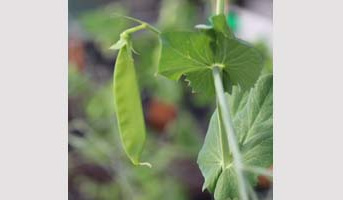Varietal innovation in pea: development of a genome editing method
Publication from the SAS and DRAGON teams, in Plant Biotechnology Journal, June 2025
Legumes play an important role in both human and animal nutrition, serving as an excellent source of plant-based protein. Additionally, their cultivation offers environmental and agronomic benefits. Among legumes, pea is the most widely cultivated in France. However, expanding its cultivation faces several challenges. To address these, INRAE is conducting research and developing tools to better understand the biology of this species and to identify genes of interest. It also aims to accelerate varietal innovation. In particular, genome editing can contribute to these goals by enabling the validation of candidate genes under study. This technique could be a valuable complementary tool for pea improvement, but until now, editing this so-called recalcitrant species has proven difficult. "Strigolactones and Allelochemicals Signaling" SAS team and "DNA Repair and Genome Engineering" DRAGON team have developed an editing protocol that overcomes this major barrier for research and varietal breeding.
Back

Legend : developing pea pods in the IJPB greenhouses
Highlight IJPB
Référence :
Soulard C, Monfort M, Pillot JP, Gery C, Chauvin L, Morlière S, Lesné A, Sugio A, Pilet-Nayel ML, Rameau C, Nogué F and de Saint Germain A (2025) Efficient and heritable gene editing through CRISPR-Cas9 in Pisum sativum. Plant Biotechnol. J., doi : https://doi.org/10.1111/pbi.70091
Contacts :
> Alexandre de Saint Germain, contact
> Fabien Nogué, contact
Équipes IJPB teams :
> "Strigolactones and Allelochemicals Signaling" SAS team
> "DNA Repair and Genome Engineering" DRAGON team